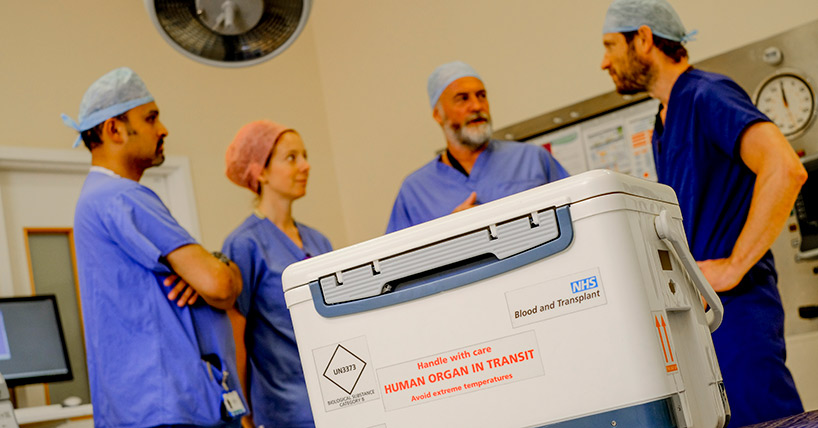Blood and Transplant Research Unit
New research unit to help organ donation and transplantation patients
Published on: 16 May 2022
Newcastle University is receiving almost £2 million for a cutting-edge research unit focused on organ donation to help improve the outcomes for patients waiting for and receiving transplants.
NHS Blood and Transplant (NHSBT) has launched a £20m set of research units in the UK across blood, organs, plasma, and stem cells.
The five Blood and Transplant Research Units (BTRUs) - co-funded by the National Institute for Health and Care Research (NIHR) and NHSBT - are aimed at providing new technologies, techniques or insights that will benefit donation, transfusion, and transplantation.
Experts at Newcastle University are working with scientists at the University of Cambridge for the NIHR BTRU in Organ Donation and Transplantation research unit - which is receiving a total of £4 million.
Their aim is to increase the number of organs available, improve long-term outcomes and enhance quality of life after transplant.

Research at the Unit
The research unit will involve a variety of work, including:
- Trial the use of enzymes to remove blood group A and B antigens from donated organs during machine perfusion, to create universal donor O type organs. This could transform clinical practice and especially benefit ethnic minority groups who currently have reduced access to transplantation due to high prevalence of blood group B.
- Increasing the use of donated organs through image analysis. The unit will further develop an app which can rate the likely performance of an organ based on its appearance – for example, how much fat there is on a donated liver – giving a prediction of the transplant outcome.
- Develop new patient reported measures that assess the impact that an organ transplant has had on a recipient’s wellbeing and assesses the quality of their experience of going through an organ transplant journey.
Andrew Fisher, Professor of Respiratory Transplant Medicine at Newcastle University and Deputy Director of the new NIHR BTRU in Organ Donation and Transplantation, said: “We are delighted to be co-hosting this new BTRU, dedicated to increasing the quantity and quality of organ transplants performed and addressing inequalities in access to organ transplantation.
“Our team of researchers from Newcastle University and Newcastle upon Tyne Hospitals NHS Foundation Trust, covering a wide range of disciplines, will continue to work closely with colleagues at the University of Cambridge and NHS Blood and Transplant to deliver on the unit’s aims.
“Input from patients and the public will play a pivotal role in our work and forms an important partnership for achieving maximum impact from the research performed.”
Many of the work strands in the BTRUs could result in new technologies and practices that can then be delivered, helping to save and improve even more lives.
They are multi-disciplinary centres of excellence which will pursue cutting-edge research in donor health and behaviour, improve transfusion practice in hospitals, increase the number of organs available and improve long-term outcomes after solid organ transplant, develop new kinds of cell therapies for blood disorders and blood cancer and, finally, reduce the risks of transmitting infections through the work that we do.

Developing innovative treatments
Health and Social Care Secretary, Sajid Javid, said: “These new research units will allow NHS Blood and Transplant to lead the way in developing innovative treatments for blood disorders and blood cancer - allowing the NHS to save even more lives.
“It will also mean more people will have access to life-saving donations, blood transfusions, and cell therapy, helping us tackle disparities that exist among those waiting for organ transplants and stem cells.
“I urge more people to consider becoming an organ, blood or stem cell donor, especially those from Black, Asian and other ethnic minority backgrounds.”
Dr Gail Miflin, Chief Medical Officer for NHSBT, added: “By collaborating with universities, these five new Blood and Transplant Research Units will help us to deliver on our mission to ‘save and improve even more lives’ and drive innovation to inform future clinical practice and improve patient outcomes.”



